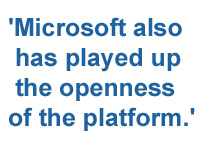Odd bedfellows: Facebook and Windows Live Spaces

In all the coverage of Microsoft allegedly pushing for a five percent stake in Facebook, there has been next-to-no mentions of Microsoft's own social-networking platform, Windows Live Spaces.
Live Spaces, when it launched as a new and improved version of MSN Spaces, already had 112 million monthly unique visitors and stored 4 billion uploaded user-uploaded photos. In 2007, Microsoft says Live Spaces has 115 million monthly unique visitors, more than 2.5 billion page views per month. Microsoft says there are 93 million Live Spaces (not necessarily users) out there.

Given that Live Spaces looks like a credible Facebook competitor (at least on virtual paper), why has Microsoft seemingly done so little to promote Live Spaces? For one, many of its users are not U.S.-based. For another, Microsoft's been struggling with how to position its Live Spaces service.
When Live Spaces launched, Microsoft emphasized the blogging/personal-publishing side of the platform. Since then, the platform and its emphasis have evolved, as explained in a July 2007 blog post by Dare Obasanjo, a program manager on the Windows Live Contacts team:
"There have been a number of updates to Windows Live Spaces over the past few months that have moved to emphasize using the site to communicate and connect with people as opposed to personal publishing. When Windows Live Spaces was launched about three years ago, it's sweet spot was as a way for users to publish blog posts, photos, lists of their favorite music or books and other forms of personal expression. Over the past few years, experience has thought us as an industry that providing a platform for our users to communicate and connect with each other is more valuable to them than simply providing a personal publishing platform."
Microsoft is hawking Live Spaces as an an advertising venue (at the same time as it is putting ads on Facebook via the Microsoft adCenter platform). From a June 2007 Microsoft Digital Advertising press release announcing "Sponsored Spaces":
"Leveraging the boom in online social networking in Asia and the growing popularity of Windows Live Spaces, Microsoft today announced the introduction of Sponsored Spaces across the region. Sponsored Spaces is a new ad platform that allows advertisers to immerse themselves in the social networking scene and communicate and engage directly with consumers. The broad introduction of the new ad platform follows in-depth consultation by Microsoft with marketers and advertisers to create a solution that converges with social networking elements. Windows Live Spaces is tightly integrated with Windows Live Messenger, making it much more effective for advertisers to promote their campaigns."
Microsoft also has played up -- to the limited extent that it plays up anything around Windows Live Spaces -- the openness of the platform. Live Spaces is already integrated with Windows Live Hotmail, Windows Live Messenger and other Live services. Live Spaces makes use of the common Live Contacts programming interface. (Facebook, for its part, is only now allegedly launching its own instant-messaging service later this week.) Microsoft also is opening gradually Live Spaces user data via Windows Live Data. As Microsoft explains on its site:
"Windows Live Data - Windows Live Data provides a mechanism by which developers can ask Windows Live users for permission to access the user's Windows Live services and data on the user's behalf. Currently Windows Live Data exposes Windows Live Contacts which is the central address book for all Windows Live services. Access to additional Windows Live services will be added for the upcoming Beta and other future releases."
Speaking of those "future releases," Microsoft is expected to launch a new version of Live Spaces this fall, most likely November, when it releases updated and final versions of a number of its Live services.
Will Microsoft take on Facebook as a head-to-head competitor in the social-networking space, at that point? Or will the Softies continue to weigh whether investing in Facebook -- in order to block Google and/or build up further its ad-platform client list -- instead? We'll soon see.